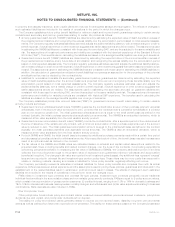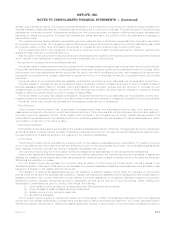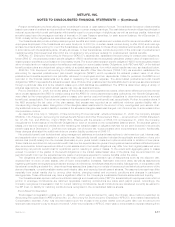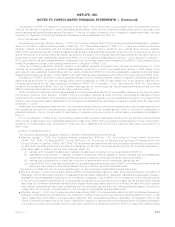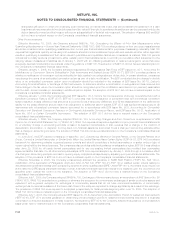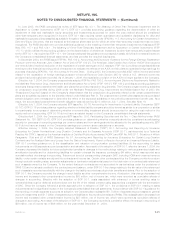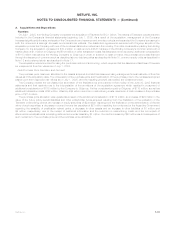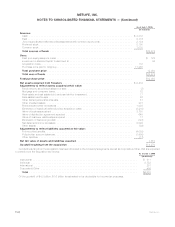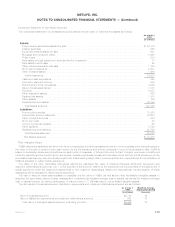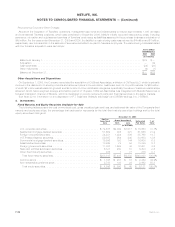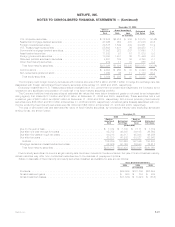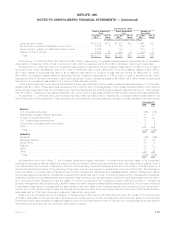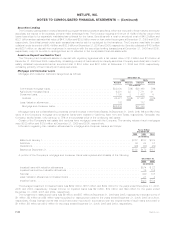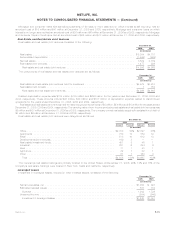MetLife 2006 Annual Report Download - page 104
Download and view the complete annual report
Please find page 104 of the 2006 MetLife annual report below. You can navigate through the pages in the report by either clicking on the pages listed below, or by using the keyword search tool below to find specific information within the annual report.In June 2005, the FASB completed its review of EITF Issue No. 03-1, The Meaning of Other-Than-Temporary Impairment and Its
Application to Certain Investments (“EITF 03-1”). EITF 03-1 provides accounting guidance regarding the determination of when an
impairment of debt and marketable equity securities and investments accounted for under the cost method should be considered
other-than-temporary and recognized in income. EITF 03-1 also requires certain quantitative and qualitative disclosures for debt and
marketable equity securities classified as available-for-sale or held-to-maturity under SFAS No. 115, Accounting for Certain Investments in
Debt and Equity Securities, that are impaired at the balance sheet date but for which an other-than-temporary impairment has not been
recognized. The FASB decided not to provide additional guidance on the meaning of other-than-temporary impairment but has issued FSP
Nos. FAS 115-1 and FAS 124-1, The Meaning of Other-Than-Temporary Impairment and its Application to Certain Investments (“FSP
115-1”), which nullifies the accounting guidance on the determination of whether an investment is other-than-temporarily impaired as set
forth in EITF 03-1. As required by FSP 115-1, the Company adopted this guidance on a prospective basis, which had no material impact on
the Company’s consolidated financial statements, and has provided the required disclosures.
In December 2004, the FASB issued FSP No. FAS 109-2, Accounting and Disclosure Guidance for the Foreign Earnings Repatriation
Provision within the American Jobs Creation Act of 2004 (“FSP 109-2”). The American Jobs Creation Act of 2004 (“AJCA”) introduced a
one-time dividend received deduction on the repatriation of certain earnings to a U.S. taxpayer. FSP 109-2 provides companies additional
time beyond the financial reporting period of enactment to evaluate the effects of the AJCA on their plans to repatriate foreign earnings for
purposes of applying SFAS No. 109, Accounting for Income Taxes. During 2005, the Company recorded a $27 million income tax benefit
related to the repatriation of foreign earnings pursuant to Internal Revenue Code Section 965 for which a U.S. deferred income tax
provision had previously been recorded. As of January 1, 2006, the repatriation provision of the AJCA no longer applies to the Company.
Effective July 1, 2004, the Company prospectively adopted FSP No. FAS 106-2, Accounting and Disclosure Requirements Related to
the Medicare Prescription Drug, Improvement and Modernization Act of 2003 (“FSP 106-2”). FSP 106-2 provides accounting guidance to
employers that sponsor postretirement health care plans that provide prescription drug benefits. The Company began receiving subsidies
on prescription drug benefits during 2006 under the Medicare Prescription Drug, Improvement and Modernization Act of 2003 (the
“Prescription Drug Act”) based on the Company’s determination that the prescription drug benefits offered under certain postretirement
plans are actuarially equivalent to the benefits offered under Medicare Part D. The postretirement benefit plan assets and accumulated
benefit obligation were remeasured to determine the effect of the expected subsidies on net periodic postretirement benefit cost. As a
result, the accumulated postretirement benefit obligation was reduced by $213 million at July 1, 2004. See also Note 16.
Effective July 1, 2004, the Company adopted EITF Issue No. 03-16, Accounting for Investments in Limited Liability Companies (“EITF
03-16”). EITF 03-16 provides guidance regarding whether a limited liability company should be viewed as similar to a corporation or similar
to a partnership for purposes of determining whether a noncontrolling investment should be accounted for using the cost method or the
equity method of accounting. EITF 03-16 did not have a material impact on the Company’s consolidated financial statements.
Effective April 1, 2004, the Company adopted EITF Issue No. 03-6, Participating Securities and the Two — Class Method under FASB
Statement No. 128 (“EITF 03-6”). EITF 03-6 provides guidance on determining whether a security should be considered a participating
security for purposes of computing earnings per common share and how earnings should be allocated to the participating security. EITF
03-6 did not have an impact on the Company’s earnings per common share calculations or amounts.
Effective January 1, 2004, the Company adopted Statement of Position (“SOP”) 03-1, Accounting and Reporting by Insurance
Enterprises for Certain Nontraditional Long-Duration Contracts and for Separate Accounts (“SOP 03-1”), as interpreted by a Technical
Practice Aid (“TPA”), issued by the American Institute of Certified Public Accountants (“AICPA”) and FSP No. FAS 97-1, Situations in Which
Paragraphs 17(b) and 20 of FASB Statement No 97, Accounting and Reporting by Insurance Enterprises for Certain Long-Duration
Contracts and for Realized Gains and Losses from the Sale of Investments, Permit or Require Accrual of an Unearned Revenue Liability.
SOP 03-1 provides guidance on: (i) the classification and valuation of long-duration contract liabilities; (ii) the accounting for sales
inducements; and (iii) separate account presentation and valuation. As a result of the adoption of SOP 03-1, effective January 1, 2004, the
Companydecreasedtheliabilityforfuturepolicyholderbenefitsforchanges in the methodology relating to various guaranteed death and
annuitization benefits and for determining liabilities for certain universal life insurance contracts by $4 million, which was reported as a
cumulative effect of a change in accounting. This amount is net of corresponding changes in DAC, including VOBA and unearned revenue
liability, under certain variable annuity and life contracts and income tax. Certain other contracts sold by the Company provide for a return
through periodic crediting rates, surrender adjustments or termination adjustments based on the total return of a contractually referenced
pool of assets owned by the Company. To the extent that such contracts are not accounted for as derivatives under the provisions of
SFAS 133 and not already credited to the contract account balance, under SOP 03-1 the change relating to the fair value of the referenced
pool of assets is recorded as a liability with the change in the liability recorded as policyholder benefits and claims. Prior to the adoption of
SOP 03-1, the Company recorded the change in such liability as other comprehensive income. At adoption, this change decreased net
income and increased other comprehensive income by $63 million, net of income tax, which were recorded as cumulative effects of
changes in accounting. Effective with the adoption of SOP 03-1, costs associated with enhanced or bonus crediting rates to
contractholders must be deferred and amortized over the life of the related contract using assumptions consistent with the amortization
of DAC. Since the Company followed a similar approach prior to adoption of SOP 03-1, the provisions of SOP 03-1 relating to sales
inducements had no significant impact on the Company’s consolidated financial statements. In accordance with SOP 03-1’s guidance for
the reporting of certain separate accounts, at adoption, the Company also reclassified $1.7 billion of separate account assets to general
account investments and $1.7 billion of separate account liabilities to future policy benefits and PABs. This reclassification decreased net
income and increased other comprehensive income by $27 million, net of income tax, which were reported as cumulative effects of
changes in accounting. As a result of the adoption of SOP 03-1, the Company recorded a cumulative effect of a change in accounting of
$86 million, net of income tax of $46 million, for the year ended December 31, 2004.
F-21MetLife, Inc.
METLIFE, INC.
NOTES TO CONSOLIDATED FINANCIAL STATEMENTS — (Continued)





